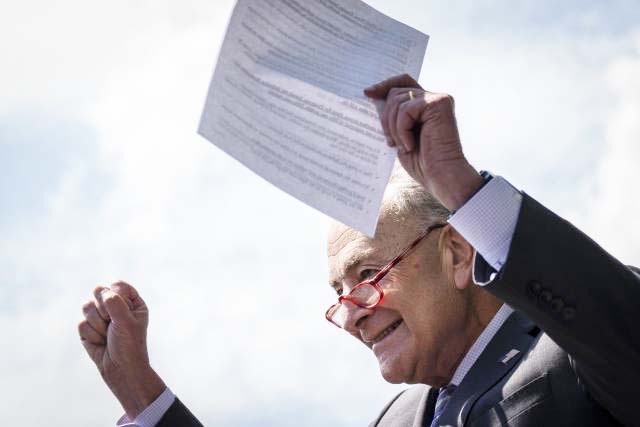Senate Majority Leader Chuck Schumer (D-NY) celebrates the passage of the controversial Inflation Reduction Act on Sunday outside the U.S. Capitol in Washington, D.C. (Image courtesy of Yahoo.Finance).
WASHINGTON, D.C. – On Sunday, Democrats in the Senate passed President Joe Biden’s sweeping economic package designed to combat climate change, address health care cost and raise taxes on large corporations.
As expected, using a streamlined process called reconciliation, the measure passed without a single Republican vote in the evenly divided Senate, where Vice President Kamala Harris cast the tie-breaker.
Republicans say that the so-called Inflation Reduction Act will do everything but that.
“You shouldn’t judge a book by its cover and you certainly shouldn’t judge this bill by its title,” Sen. Mike Lee (R-Ut) said after the unusual vote on Sunday.
“American families cannot afford the Biden administration’s latest tax and spend scheme,” Lee continued, adding his voice to a chorus of GOP opposition to the plan. “If the definition of insanity is doing the same thing and expecting different results, then spending more money and increasing taxes to reduce inflation meets that definition.”
The Inflation Reduction Act is actually a scaled-back version of Biden’s multi-trillion dollar “Build Back Better” initiative, which was dead on arrival in the Senate in December.
Biden applauded the passage of the bill in a prepared White House statement.
“Today, Senate Democrats sided with American families over special interests,” he said, “by voting to lower the cost of prescription drugs, health insurance, everyday energy costs and reduce the deficit, while making the wealthiest corporation finally pay their fair share.
“I ran for president promising to make the government work for working families again. That is what this bill does – period.”
The Congressional Budget Office estimates the Inflation Reduction Act (IRA) will reduce the deficit by more than $100 billion over ten years.
But Republicans insist that the IRA legislation, while doing nothing to immediately reduce inflation, will raise taxes and adversely impact jobs.
“These hundreds of billion of dollars will serve a purpose,” said one of Lee’s colleagues, Sen. Marsha Blackburn (R-TN). “But not to reduce inflation or bring relief.
“Blue states, unions and radical activists will once again come out on top. Meanwhile families who are working hard to make ends meet, workers, business owners and local leaders are on the verge of losing everything.”
Economists tend to agree, saying that the IRA’s effects on the economy will be more long-term.
“There is very little that policy makers can do, on a legislative basis, to impact inflation overnight,” according to Shai Akabas, the director of economic policy for the Bipartisan Policy Center. “That is primarily the job of the Federal Reserve.”
The Federal Reserve has increased interest rates, which raised the cost of borrowing money and should eventually slow spending.
But the immediate result of those Federal Reserve decisions is more pain for consumers.
The cost of mortgages and credit card will go up and hiring will slow with the likely result that U.S. will drift into a recession.
Meanwhile, Biden administration talking heads are making the rounds of media talk shows arguing that the definition of a recession needs to change.
The president’s domestic agenda had seemed to be on life support for much of the past year, until moderate Democrat Sen. Joe Manchin (D-WA) suddenly reversed course in June.
While still rejecting Biden’s $3.5 trillion proposal, Manchin signaled that he was interested in negotiating a much-reduced version of Build Back Better.
The legislation that emerged from those talks was a plan that included a $400 billion investment in fighting climate change funded by a 15 percent minimum tax on American corporations making more than $1 billion a year.
After the rare Sunday vote in the Senate, Lee condemned his Democratic colleagues for raising taxes at a time when inflation has grown to 9.1 percent nationally and nearly 15 percent in Utah.
Lee explained that the non-partisan Joint Committee on Taxation estimates that the IRA will raise taxes by $313 billion over the next 10 years. Scholars at the Wharton School of Business at the University of Pennsylvania also predict that the legislation would not impact the deficit until 2027.
“The non-partisan Joint Committee on Taxation … says this will hurt Americans in every tax bracket,” added Sen. Rob Portman (R-OH).
“They say that more than half of the more than $300 billion in new taxes will fall on folks making less than $400,000 a year.
“Well, that directly contradicts promises (made by President Biden) not to increase taxes on Americans at that level.”
House Speaker Nancy Pelosi announced last week that she will call representatives back from their month-long recess on Friday to consider the IRA legislation, which is expected to pass.

